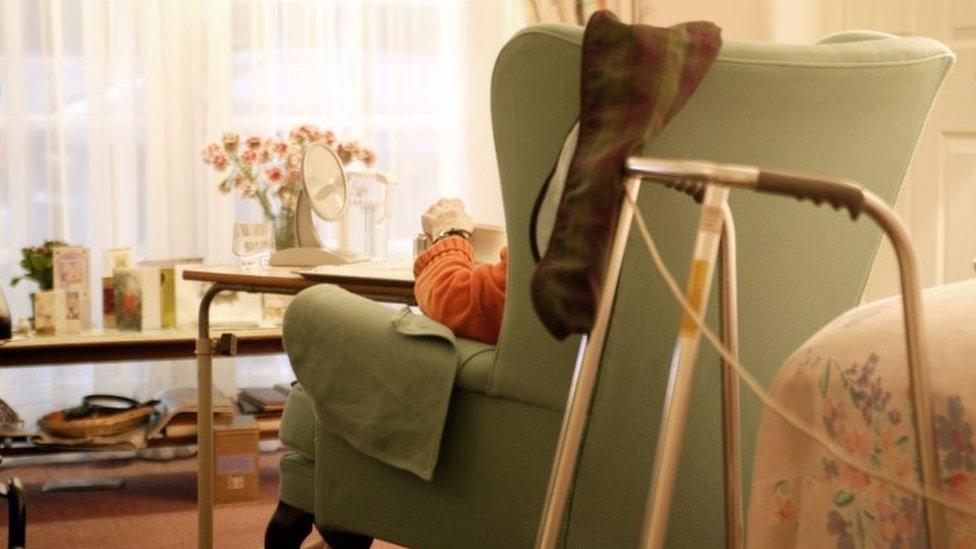Social care due to be tackled before pandemic hit
- Published

I have written many sentences, many times, suggesting that ministers have agreed a way to sort out the creaking system of social care.
Right now, in the midst of a huge crisis, I'm certainly not going to do that again.
The government's plans for spending have all been blown out of the water.
Whitehall is in the grip of the biggest test in decades.
More importantly, many families' lives have been turned upside down.
But the new and terrible pressures of the coronavirus crisis have exposed just how fragile the system that's meant to look after the most vulnerable really is. And we can reveal now some important clues about what ministers were planning to do before the crisis really hit home.
And lo and behold, they were likely to adopt the one model that is already on the shelf.
There is nothing new about the principle of capping the costs of social care. After years of delay by successive governments and months of promises from the current one, it's now understood that before the pandemic struck the UK, ministers had reached what one senior figure involved described as "90% agreement" on at least part of a solution.
At the start of the year there was a series of meetings between senior ministers and Sir Andrew Dilnot, who'd designed a system where people keep more of their assets before they have to contribute to the cost of their care, but the amount they would have to pay over their lifetime would be limited too.
That model was even passed into law under the coalition, but then ditched by David Cameron.
But be in no doubt, this has gone on for a very long time. Here is my colleague, Mark Easton talking to Andrew Dilnot about his plans nearly 10 years ago.
This year, while there was progress towards adopting the model, conclusions over the precise levels of funding, and the balance between the public purse and the private individual were delayed until the autumn, with the possibility of a specific tax to help find the extra billions on the table.
The idea was parked before the March Budget, with the expectation at senior levels of government that they had the basis of an agreement for a plan to be finalised and then announced at the government's massive spending review.
The price tag would stretch to many billions, and was highly dependent on where the cap was set, and whether or not the government really had the appetite to introduce a new tax.
Downing Street sources deny that there were any final decisions on a new model before the epidemic.
But even in the midst of a crisis, a government source told the BBC that is "still the direction of travel".
Ministers privately acknowledge that reform is very long overdue and that 'Dilnot is advantageous' as the legislation required to put it in place passed through Parliament years ago.
But there is a hint in government too of something more radical, partly because of the experience of this crisis. Ministers are also exploring the option of providing funds to care homes more directly, rather than relying simply on the current system that uses local councils.
This week in the Commons, Health Secretary Matt Hancock hinted as much, saying trying to get cash to care homes had been challenging and "raises a question not just for the crisis but for the longer term".
"When I am held accountable at this dispatch box for the actions of local authorities, I can give support, but we do not have the direct levers," he said.
After years of cuts, local councils are under massive financial pressure, and in turn, care homes who they fund have been in many cases, absolutely cash-strapped too. No-one seems now to disagree there is a huge need for reform. But as and when the government has the capacity and will to act, you can expect intense discussions about the wisdom of making any big changes.
The Conservatives had also considered offering free personal care in their election manifesto. But the proposal was ditched then because of the cost.
That is already available in Scotland; home care is free for the over 75s in Northern Ireland, and some care costs are capped in Wales too.
Downing Street would not be drawn in any detail on the plans under consideration.
A government spokesperson said ministers were "absolutely committed to bringing forward a plan, but that it was right to take time to develop a fair and sustainable solution".
